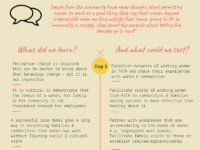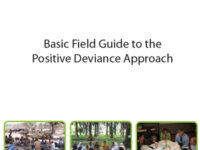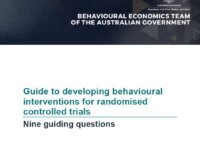The mission of TEN is to ensure a scientifically and ethically responsible dissemination of applied behavioural insights throughout Europe and beyond. This is done through a range of Open Access (OA) online resources and member activities.
TEN hosts the Nudge Database, a community-sourced collection and validation system for cases of behavioural insights, including everything from interesting hypotheses to laws that have been applied on the basis of large randomised experiments.
The database is…
Global: Behavioural Insights
A collection of design patterns, or ‘gambits’, for influencing user behaviour through design. It’s applicable across product, service, interaction and architectural design, aimed particularly at socially and environmentally beneficial behaviour change. The patterns are drawn from a range of disciplines, and are phrased as questions or provocations to enable the toolkit’s use as both a brainstorming tool and a guide for exploring the field of design for behaviour change.
It includes…
The publishers describe the PD concept as: based on the observation that in every community or organization, there are a few individuals or groups whose uncommon but successful behaviors and strategies have enabled them to find better solutions to problems than their neighbors who face the same challenges and barriers and have access to same resources.
This resource orients newcomers to the Positive Deviance (PD) approach and provide the essential tools to get started. It includes a brief…
This guide outlines BETA’s approach to developing behavioural interventions for randomised controlled trials (RCTs), based round 9 guiding questions through four project phases:
Discovery, Diagnosis, Design, Delivery. The guide is designed to primarily help with the discovery and diagnosis phases.
It also includes basic guidance on setting up an RCT.
The website includes an academic directory of those working in the behavioral economics research community.
Toolkit
Implementation Guidance for Executive Order 13707: Using Behavioral Science Insights to Better Serve…

Behavioural insights (BI) is an inductive approach to policy making that combines insights from psychology, cognitive science, and social science with empirically-tested results to discover how humans actually make choices. Driven by experimentation and piloting, BI challenges established assumptions of what is thought to be rational behaviour of citizens and businesses, informing decision makers of the “actual” behaviours driving economic or societal outcomes. Behavioral economics, a…
Case Study
Integrating Design and Behavioural Insights to increase the take-up of an education savings program…
The Canada Learning Bond, a government education savings program providing a financial incentive to low income Canadians, turned to behavioural insights (BI) to tackle persistent low take-up. Following unsuccessful BI trials based on academic literature and expertise, we turned to Design. In a Government of Canada first, combining lessons learned from human centred design processes including stories from citizens and BI we developed outreach that significantly improved the take-up of the Bond.
Under the Public Sector Trial Scheme, this project aims to examine how to enhance the drivers' behavior by trial on the public sectors' vehicles by using driving safety modules - Safematics Smart Safety System (4S Solution) and Advanced Driver Assistance Systems, or ADAS to help drivers in the driving process. Through this, the government has a way of improving drivers' driving behavior and get more useful data to study the road design in urban settings.
Case Study
Positive Deviance Pilot: strategies for enhancing women’s public participation in Pakistan’s…

UNDP wanted to understand what strategies women outliers or “positive deviants” in remote and deeply conservative areas which have minimal technology coverage, used to successfully join the workforce, become educated and serve their communities. Positive deviance is an experiential problem-solving approach that identifies locally designed solutions and ensures narratives of the outliers are understood before designing a programme; this is critical for designing behavioural change…
This programme was developed to address critical strategic challenges in the Criminal Justice Sector in Ireland so as to enhance sectoral leadership and public value. A cross agency collaborative learning and implementation methodology was used. High profile reviews of deep seated cultural and procedural challenges have inspired this programme. The IPA and agencies across the criminal justice system have taken an innovative approach to collaboration, learning and implementation. .




